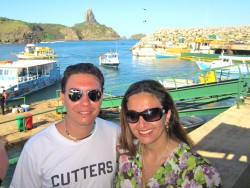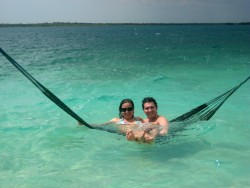- Home » Expat Articles » Interviews » American Expat Living in Bolivia - Interview with Raquel
American Expat Living in Bolivia - Interview with Raquel
| Published: | 7 Apr at 9 AM |
Want to get involved?
Become a Featured Expat and take our interview.
Become a Local Expert and contribute articles.
Get in touch today!
Become a Local Expert and contribute articles.
Get in touch today!
Filed: Interviews,Bolivia
The mastermind behind 3rdCultureChildren Blog is a Foreign Service spouse, mother of 3 third-culture children aged 8 and under, with an endless passion for discovering and learning new languages, cultures, traveling and photography. Before joining the foreign service lifestyle, her background in Science and research took her to understand that world is much more than the geographic and physical boundaries may display it. Se enjoys teaching, talking, and, as an avid blogger, sharing hers and her family's stories and lessons learned with other expat families. She's contributed her experiences to the Foreign Service Journal, online publications and to a recent book on expat resilience. She initially began blogging to share impressions, observations and along-the-road experiences with families and friends, and later other expats experiencing similar challenges/adventures. So the blog morphed into more than just a quasi-travel and photo journal. Raquel's expat blog is called 3rd Culture Children (see listing here)
Where are you originally from?
Rio de Janeiro, Brazil.
In which country and city are you living now?
La Paz, Bolivia
How long have you lived in Bolivia and how long are you planning to stay?
Since August 2012. Planning to stay until June 2014.
Why did you move to Bolivia and what do you do?
Because of my husband's assignment with the US Foreign Service. I also have a full-time job with the US Embassy La Paz, and have been working since March 2013.
Did you bring family with you?
Yes. The two of us and our three children, aged 8, 6 and 3.
How did you find the transition to living in a foreign country?
Extremely easy, as a matter of fact. I grew up in Brazil, where my parents also worked for the Brazilian government. Our original family of 5 [my parents and my 2 brothers] were often requested to move to different cities, changing schools every couple of years. As an adult, working as a laboratory researcher, moving was also part of my normal routine. After marrying my husband, and due to his assignments with the State Department foreign service, the cycle 'moving/adjusting/changing/re-inventing' has become a regular task on our lives [smiles!].
Was it easy making friends and meeting people; do you mainly socialise with other expats?
It's never as easy as one expects. There are always challenges, being those related to language [although in our household we commonly switch between Portuguese-English-Spanish], culture, new schools, new jobs [for me, especially!]. Leaving old friends behind, and aiming to make new ones is never easy. I try to think of myself as a 'serial-social being'. I'm always on-the-go, and throughout the years, I found myself displaying social skills I didn't really know I had. I'm social because it's a necessity. But I also enjoy the change, which tends to make the moves a bit easier. Especially on the family - it's less difficult to face challenges when one has an idea what could be ahead of them, and has the time and the emotional support to deal with them...
What are the best things to do in the area; anything to recommend to future expats?
Bolivia is a country with beautiful landscapes. Any outdoors activities are highly recommended, if the basic precautions [with the high altitude, especially] are taken. The Bolivian people tend to be warm and welcoming. Shopping for arts and crafts should be included in any expats visiting list, as well as, reserving some time to enjoy the typical food, and the dancing and musical expressions, only found around the Andean region.
What do you enjoy most about living in Bolivia?
The climate is great - it feels like a nice Fall day all year around. We live surrounded by mountains, which offers us a very soothing scenario - if one likes to lounge around, reading a good book, or enjoying a glass of wine by the fireplace, that's definitely a place to be. The crime rate [a crucial point for any expat list!] is very low, and La Paz is a friendly city for families - lots of parks and activities to do with/bring little kids along. Again: safety is key.
How does the cost of living in Bolivia compare to home?
Much less than in the USA, or even in Brazil.
What negatives, if any, are there to living in Bolivia?
It's a landlocked territory - we're far from the water. Also, the high altitude can play not-so-funny games with one's health. Our family, so far, hasn't suffered much from those effects, but we've heard others complain about getting sick all the time... Each one is different, and again, the regular, recommended medical/health advices should be taken very seriously.
If you could pick one piece of advice to anyone moving to Bolivia, what would it be?
Bring your best adventurous spirit - you'll need it! Also, keep your expectations low: it's the bet advice to a prospective expat or visiting fellow - expecting less, one may be pleasantly surprised with the outcome!
What has been the hardest aspect to your expat experience so far?
The difficulties to fly out of Bolivia to other countries, presently. From previous posts, the physical distance between our family nucleus and our parents.
When you finally return home, how do you think you'll cope with repatriation?
Communicating with others, we hope! We have a very good group of friends and former colleagues at home [it's Washington DC, and we all work for the government, so, it's pretty common to have people coming and going, all the time!] It's all part of work: the moving, the paking-out...
What are your top 5 expat tips for anyone following in your footsteps?
As a traveling family, we've lived in Mozambique, South Africa, Brazil, Bolivia, and during our work assignments, we traveled to England, Chile, USA and Swaziland. I liked the idea of organizing not only our travel notes, but also providing resources for other parents, and encouraging an exchange of ideas through comments, questions and suggestions from viewers. The name for the blog came from the term itself: “Third Culture Children” are children whose parents come from distinct cultures, and grow up under a hybrid environment, experiencing diverse cultural growth. “The result of this transcontinental growth can never be taught or learned or fully understood by anyone who hasn’t actually experienced it. The developing child takes the culture of their parent’s passport country, or their first culture, to a foreign land. The result is that the child (and later on, the adult) adopts the qualities of the Second Culture into their preexisting First Culture, creating a unique cultural perspective known as the Third Culture”. As an expat who is now raising three children, all aged 6 and under, the titled seemed a natural fit! I’m so pleased to share with other expatriates, parents, and traveling families, not only the beauty and excitement of traveling, but also resources regarding languages, social and cultural adjustments, and our not-so-professional advice as “parents-on-the-go“.
How can you be contacted for further advice to future expats coming to your area?
Feel free to send me a note thru Twitter, or visit our expat blog, http://3rdculturechildren.com, sharing your comments on any recent post or pages - I'd love to hear from you!
Here's the interview with Raquel...
Where are you originally from?
Rio de Janeiro, Brazil.
In which country and city are you living now?
La Paz, Bolivia
How long have you lived in Bolivia and how long are you planning to stay?
Since August 2012. Planning to stay until June 2014.
Why did you move to Bolivia and what do you do?
Because of my husband's assignment with the US Foreign Service. I also have a full-time job with the US Embassy La Paz, and have been working since March 2013.
Did you bring family with you?
Yes. The two of us and our three children, aged 8, 6 and 3.
How did you find the transition to living in a foreign country?
Extremely easy, as a matter of fact. I grew up in Brazil, where my parents also worked for the Brazilian government. Our original family of 5 [my parents and my 2 brothers] were often requested to move to different cities, changing schools every couple of years. As an adult, working as a laboratory researcher, moving was also part of my normal routine. After marrying my husband, and due to his assignments with the State Department foreign service, the cycle 'moving/adjusting/changing/re-inventing' has become a regular task on our lives [smiles!].
Was it easy making friends and meeting people; do you mainly socialise with other expats?
It's never as easy as one expects. There are always challenges, being those related to language [although in our household we commonly switch between Portuguese-English-Spanish], culture, new schools, new jobs [for me, especially!]. Leaving old friends behind, and aiming to make new ones is never easy. I try to think of myself as a 'serial-social being'. I'm always on-the-go, and throughout the years, I found myself displaying social skills I didn't really know I had. I'm social because it's a necessity. But I also enjoy the change, which tends to make the moves a bit easier. Especially on the family - it's less difficult to face challenges when one has an idea what could be ahead of them, and has the time and the emotional support to deal with them...
What are the best things to do in the area; anything to recommend to future expats?
Bolivia is a country with beautiful landscapes. Any outdoors activities are highly recommended, if the basic precautions [with the high altitude, especially] are taken. The Bolivian people tend to be warm and welcoming. Shopping for arts and crafts should be included in any expats visiting list, as well as, reserving some time to enjoy the typical food, and the dancing and musical expressions, only found around the Andean region.
What do you enjoy most about living in Bolivia?
The climate is great - it feels like a nice Fall day all year around. We live surrounded by mountains, which offers us a very soothing scenario - if one likes to lounge around, reading a good book, or enjoying a glass of wine by the fireplace, that's definitely a place to be. The crime rate [a crucial point for any expat list!] is very low, and La Paz is a friendly city for families - lots of parks and activities to do with/bring little kids along. Again: safety is key.
How does the cost of living in Bolivia compare to home?
Much less than in the USA, or even in Brazil.
What negatives, if any, are there to living in Bolivia?
It's a landlocked territory - we're far from the water. Also, the high altitude can play not-so-funny games with one's health. Our family, so far, hasn't suffered much from those effects, but we've heard others complain about getting sick all the time... Each one is different, and again, the regular, recommended medical/health advices should be taken very seriously.
If you could pick one piece of advice to anyone moving to Bolivia, what would it be?
Bring your best adventurous spirit - you'll need it! Also, keep your expectations low: it's the bet advice to a prospective expat or visiting fellow - expecting less, one may be pleasantly surprised with the outcome!
What has been the hardest aspect to your expat experience so far?
The difficulties to fly out of Bolivia to other countries, presently. From previous posts, the physical distance between our family nucleus and our parents.
When you finally return home, how do you think you'll cope with repatriation?
Communicating with others, we hope! We have a very good group of friends and former colleagues at home [it's Washington DC, and we all work for the government, so, it's pretty common to have people coming and going, all the time!] It's all part of work: the moving, the paking-out...
What are your top 5 expat tips for anyone following in your footsteps?
- Dream away. And dream big. Dream of traveling to unknown places, learning from new people, immersing into new cultures.
- Keep your expectations low. Many surprises should come your way if you're not waiting for anything!
- Be social. Be friendly. Be smart. Street Smart! Be conscious and be aware of your surroundings, as well. Teaching lessons come in different envelopes, sometimes, in a not-so-nice ones!
- Try to learn a new language, try to communicate with the locals and understand their stories and their culture. Communicate. Listen and be heard.
- Attempt to comprehend the new country's traditions, faith, and fears... The harmonious relationship between the local community and Mother Nature. Learn from their experiences and build your own story. It's worthy every second in invest in!
As a traveling family, we've lived in Mozambique, South Africa, Brazil, Bolivia, and during our work assignments, we traveled to England, Chile, USA and Swaziland. I liked the idea of organizing not only our travel notes, but also providing resources for other parents, and encouraging an exchange of ideas through comments, questions and suggestions from viewers. The name for the blog came from the term itself: “Third Culture Children” are children whose parents come from distinct cultures, and grow up under a hybrid environment, experiencing diverse cultural growth. “The result of this transcontinental growth can never be taught or learned or fully understood by anyone who hasn’t actually experienced it. The developing child takes the culture of their parent’s passport country, or their first culture, to a foreign land. The result is that the child (and later on, the adult) adopts the qualities of the Second Culture into their preexisting First Culture, creating a unique cultural perspective known as the Third Culture”. As an expat who is now raising three children, all aged 6 and under, the titled seemed a natural fit! I’m so pleased to share with other expatriates, parents, and traveling families, not only the beauty and excitement of traveling, but also resources regarding languages, social and cultural adjustments, and our not-so-professional advice as “parents-on-the-go“.
How can you be contacted for further advice to future expats coming to your area?
Feel free to send me a note thru Twitter, or visit our expat blog, http://3rdculturechildren.com, sharing your comments on any recent post or pages - I'd love to hear from you!
Grab a featured expat badge that links to this interview!
 Copy and paste code to display the Featured Expat Badge:
Copy and paste code to display the Featured Expat Badge:Comments » No published comments just yet for this article...
Feel free to have your say on this item. Go on... be the first!




 Raquel is an American expat living in Bolivia. Blog description: Life of a globetrotting family of 5 in the US foreign service. La Paz will be our home for the next 2 years - we're excited and curious with all the possibilities...
Raquel is an American expat living in Bolivia. Blog description: Life of a globetrotting family of 5 in the US foreign service. La Paz will be our home for the next 2 years - we're excited and curious with all the possibilities...





